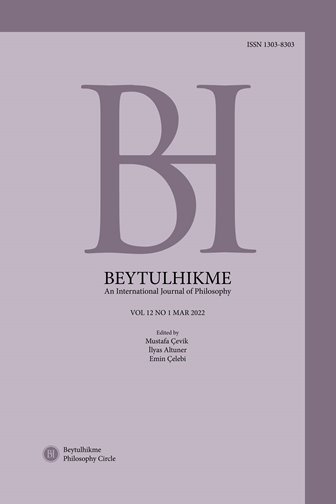Author :
Abstract
Bu çalışma ontolojik kanıtın modal versiyonunu savunan Hartshorne’un Tanrı kavramının mantıksal imkanından O’nun zorunlu varlığını çıkarımlayan yorumunu konu almaktadır. Hartshorne, klasik teizmin Tanrı anlayışına dayalı bir ontolojik kanıtın birtakım güçlüklerle karşılaştığını ve bu güçlükleri aşabilmenin yolunun neo-klasik bir Tanrı anlayışı gereği Tanrı’da varlık-aktüellik arasında bir ayrıma gidilmesi durumunda mümkün olacağını savunur. Bu nedenle bu makalede öncelikle Hartshorne’un modal kanıtı ele alınmakta, daha sonra varlık-aktüellik ayrımına dayanan neo-klasik bir yorumun ontolojik kanıta yönelik eleştirileri aşıp aşmadığı irdelenmektedir.
Keywords
Abstract
There is a modal version of the ontological argument that Hartshorne defends and deduces the necessary existence of God from the logical possibility of the concept of God. Hartshorne argues that an ontological argument which is based on the classical theism's conception of God encounters some difficulties and the way to overcome these difficulties is possible if there is a distinction between existence and actuality in accordance with a neoclassical conception of God. In this paper, firstly, Hartshorne's modal proof is examined, then it is discussed whether a neo-classical conception based on the existence-actuality distinction overcomes the criticisms of modal ontological proof.
Keywords
- Clarke, W. Norris. (1990). Charles Hartshorne’s Philosophy of God: A Thomistic Critique. Charles Hartshorne’s Concept of God: Philosophical and Theological Responses. (Ed. Santiago Sia). Dordrecht: Springer Science & Business Media, 103123.
- Dağ, Mehmet. (1978). Ontolojik Delil ve Çıkmazları. Ankara Üniversitesi İlahiyat Fakültesi Dergisi, 23, 287-318.
- Gunton, Colin. E. (2001). Being and Becoming: The Doctrine of God in Charles Harts- horne and Karl Bath, Eugene: Wipf & Stock Publishers.
- Findlay, J. N. (1948). Can God’s Existence Be Disproved?. Mind, 57:226, 176-183.
- Hartshorne, Charles. (1961). The Logic of the Ontological Argument. The Journal of Philosophy, 58:17, 471-473.
- Hartshorne, Charles. (1963a). Real Possibility. The Journal of Philosophy, 60:21, 593- 605.
- Hartshorne, Charles. 1963b). Abstract and Concrete in God: A Reply. Review of Metaphysics, 17:2, 289-295.
- Hartshorne, Charles. (1964). Man’s Vision of God and the Logic of Theism, Hamden: Archon Books.
- Hartshorne, Charles. (1967). Necessity, The Review of Metaphysics, 21:2, 290-296.
- Hartshorne, Charles. (1974). God’s Existence: A Conceptual Problem. Religious Experience and Truth. (Ed. Sydney Hook). New York: New York University Press, 211-219.
- Hartshorne, Charles. (1977). John Hick on Logical and Ontological Necessity. Re- ligious Studies, 13:2 155-165.
- Hartshorne, Charles. (1991a). The Logic of Perfection. Illinois: Open Court.
- Hartshorne, Charles. (1991b). Anselm’s Discovery: A Re-Examination of the Ontological Proof for God’s Existence. Illinois: Open Court,
- Hartt, Julian. (1963). The Logic of Perfection. The Review of Metaphysics, 19:4, 749-
- Hick, John. (1967). A Critique of the Second Argument. The Many-Faced Argument: Recent Studies on the Ontological Argument for the Existence of God. (Ed. John Hick & Arthur C. McGill). New York: The Macmillan Company, 341-356.
- Hick, John. (1971). Arguments for the Existence of God. New York: Herder and Herder.
- Malcolm, Norman. (1960). Anselm’s Ontological Argument. The Philosophical Re- view, 69:1, 41-62.
- Oppy, Graham. (1995). Ontological Arguments and Belief in God. Cambridge: Camb- ridge University Press.
- Pailin, David A. (1968). Some Comments on Hartshorne’s Presentation of The On- tological Argument. Religious Studies, 4:1, 103-122.
- Plantinga, Alvin. (1961). A Valid Ontological Argument?. The Philosophical Review, 70:1, 93-101.
- Plantinga, Alvin. (1969). Review: Anselm’s Discovery: A Re-Examination of the Ontological Proof for God’s Existence. The Philosophical Review, 78:3, 405
- Purtill, R. L. (1966). Hartshorne’s Modal Proof. The Journal of Philosophy, 63:14, 397-
- Sia, Santiago. (1985). God in Process Thought: A Study in Charles Hartshorne’s Concept of God. Dordrecht: Martinus Nijhoff Publishers.
- Vaught, Carl G. (1972). Hartshorne’s Ontological Argument: An Instance of Misp- laced Concreteness. International Journal for Philosophy of Religion, 3:1, 18-34.
- Viney, Donald W. (1985). Charles Hartshorne and the Existence of God. Albany: State University of New York Press.
- Viney, Donald W. Charles Hartshorne: Theistic and Anti-Theistic Arguments. Son Erişim Nisan 10, 2021. https://www.iep.utm.edu/hart-t-a/ Öz: Bu çalışma ontolojik kanıtın modal versiyonunu savunan Hartshorne’un Tanrı kavramının mantıksal imkanından O’nun zorunlu varlığını çıkarımlayan yorumunu konu almaktadır. Hartshorne, klasik teizmin Tanrı anlayışına dayalı bir ontolojik kanıtın birtakım güçlüklerle karşılaştığını ve bu güçlükleri aşabilmenin yolunun neo-klasik bir Tanrı anlayışı gereği Tanrı’da varlık-aktüellik arasında bir ayrıma gidilmesi durumunda mümkün olacağını savunur. Bu nedenle bu makalede öncelikle Hartshorne’un modal kanıtı ele alınmakta, daha sonra varlık-aktüellik ayrımına dayanan neo-klasik bir yorumun ontolojik kanıta yönelik eleştirileri aşıp aşmadığı irdelenmektedir. Anahtar Kelimeler: Ontolojik kanıt, Hartshorne, Tanrı, zorunluluk, varlık, aktüellik.
